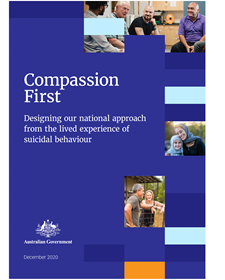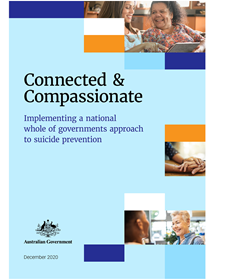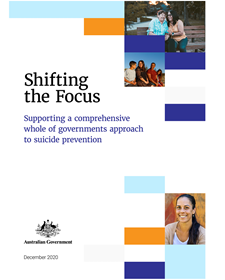The Australian Government
This is a new plan, or an update on the 5th National Mental Health & Suicide Prevention Plan, which was ending this year. Mental health and suicide prevention is being transformed if what is promised is delivered.
https://www.health.gov.au/resources/publications/the-australian-governments-national-mental-health-and-suicide-prevention-plan
Minister’s Message
We are transforming Australia’s mental health and suicide prevention system.
The Morrison Government will undertake significant structural reform of the mental health and suicide
prevention system through the 2021-22 Budget, with a record $2.3 billion investment in critical services and supports — the single largest Commonwealth investment in mental health and suicide prevention in Australia’s history.
Mental health and suicide prevention is a key priority for the Morrison Government and a central feature of our long-term National Health Plan.
Every year, more than 3,000 people lose their lives to suicide, and suicide remains the leading cause of death for Australians between the ages of 15 and 44.
In addition, 1 in 5 Australians will experience mental illness each year. The personal toll on the lives of
individuals, and their families and carers is immense. It also has a profound effect on our society, health and social services, and economy.
The Morrison Government is committed to working towards zero suicides and transforming the mental health system, to ensure that all Australians can access the right care whenever and wherever they need.
We have undertaken an ambitious reform agenda, recognising Australians need a system that acts early to help people before mental health conditions and suicidal distress worsen. We acknowledge that whole-of government and whole-of-community changes are needed to deliver preventative, compassionate, and
effective care.
The National Mental Health and Suicide Prevention Plan (the Plan) is based on five pillars:
- Prevention and early intervention
- Suicide prevention
- Treatment
- Supporting the vulnerable
- Workforce and governance
This $2.3 billion plan builds on the Morrison Government’s significant existing investment in mental health services for Australians throughout the 2019-20 bushfires and COVID-19 pandemic. This brings the
Government’s total estimated mental health spend to $6.3 billion in 2021-22 in the health portfolio alone, an almost 90% increase since 2012-13.
Based on the principles of Prevention, Compassion and Care, the Plan will invest $1.4 billion in high quality and person-centred treatment, which includes the development of a national network of mental health treatment centres for adults, youth and children through the Head to Health and headspace programs.
These investments will transform mental health care in Australia in several fundamental ways, including by:
establishing a network of multidisciplinary mental health centres for adults, young people and
children through the adult and child Head to Health and youth headspace programs
building a world-class Head to Health digital platform to harness the power of technology to help
Australians dealing with mental health issues
ensuring that our mental health and suicide prevention system reaches into the places where
Australians work, learn and live – not just at emergency departments and health services
enhancing mental health care in primary care by supporting our general practitioners,
strengthening the involvement of consumers and carers, and expanding Medicare services so
that Australians can access new and innovative types of care.
Pillar 2
Suicide Prevention $298.1 million (page 11)
Suicide has a devastating and immeasurable impact on individuals, families, friends and communities.
A whole-of-government approach informed by lived experience, which responds earlier to distress, is
needed to prevent suicide.
The Government remains deeply committed to working towards zero suicides and is investing
$298.1 million towards suicide prevention.
Responding to: Productivity Commission Recommendations 4 and 9, and National Suicide Prevention Adviser Recommendations 1, 5, 6 and 8
The Productivity Commission and National Suicide Prevention Adviser recommended:
the establishment of a National Suicide Prevention Office to set strategic directions
investment in effective aftercare and postvention
a whole-of-government approach to suicide prevention that responds earlier to distress
empowerment of Aboriginal and Torres Strait Islander communities to prevent suicide.
Aboriginal and Torres Strait Islander peoples experience a higher rate of suicide to non-Indigenous Australians.
We are committed to better supporting the social, emotional and mental health and wellbeing of Aboriginal and Torres Strait Islander peoples. Pillar 4 – Supporting the Vulnerable outlines our approach to addressing this critical and complex issue.
National Suicide Prevention Office – embedding
a whole-of-government approach
The Government will provide $12.8 million to create a National Suicide Prevention Office (NSPO) to oversee the national whole-of-government approach to suicide prevention.
Aftercare, postvention and distress intervention
A previous suicide attempt is one of the greatest risk factors for suicide death. Between 15 and 25% of people who make a non-fatal attempt at suicide will make an additional suicide attempt, with the risk highest in the three month period following a suicide attempt.
Half of the people discharged from hospital following a non-fatal suicide attempt do not receive follow up treatment. This must change. We also know that those bereaved by suicide, including family, friends and colleagues, are at a higher risk of suicide.
In partnership with states and territories, we will provide:
$158.6 million for universal aftercare services for every Australian discharged from hospital following a
suicide attempt. Aftercare services provide follow-up care in the immediate months after a suicidal crisis
or attempt, and support individuals to seek appropriate help when they need it most.
o This also includes $9.8 million to trial broader referral pathways for anyone who has attempted
suicide or experienced suicidal distress that may not have gone to a hospital.
$22.0 million to provide national suicide postvention services which help those bereaved or impacted by suicide, including families, friends, workplaces, schools, community groups, frontline responders and
witnesses.
$31.2 million to pilot a National Distress Intervention program which will reach people in crisis and provide immediate support. This investment also includes:
o $6.6 million to implement national standards for Safe Spaces services
o $2.1 million to expand the Roses in the Ocean CARE connect service.
Distress Intervention Trials
People often show signs they are struggling well before they connect with a mental health service or seek
suicide prevention supports. These people are often in contact with other areas of health or social services, such as Centrelink or the Family Court. Non-mental health contacts create a unique opportunity for the provision of early support that may reduce longer-term mental health assistance.
The Government will work with the states and territories to establish Distress Intervention trials in each jurisdiction.
These will be modelled on a Scottish Distress Brief Intervention Program, developed in 2016 to address a
significant gap in support for those presenting with distress.
CASE STUDY – Scottish Distress Brief Intervention
In 2016, Scotland commenced a pilot Distress Brief Intervention (DBI) Program in 4 locations. The DBI program provides a framework for responding compassionately and proactively to people experiencing distress.
Individuals presenting to frontline workers trained in DBI (including health workers, police and paramedics) are provided with a rapid response. If agreed, they are referred to a DBI service who contacts the individual within 24 hours to arrange further support. This support is provided over two weeks and focuses on equipping individuals with the skills they need to effectively manage their own wellbeing and prevent future crises.
Early evaluations have found people who received a DBI intervention generally found it compassionate and effective at reducing their distress, with findings suggesting DBI may prevent suicidal behaviour.
Supporting communities to prevent suicide
We are committed to ensuring services are available where people need them, with Australia-wide programs and services, as well as locally-focused services.
To support communities to prevent suicide we are providing:
$61.6 million to expand the National Suicide Prevention Leadership and Support Program. This will
support a range of whole-of-population suicide prevention programs to respond to emerging priorities
and encourage new and innovative approaches to build awareness, resilience and community
capacity to prevent suicide. The current program supports a range of initiatives, such as Suicide
Prevention Australia, the R U OK? campaign and the Mindframe National Media initiative.
$12.0 million to continue the delivery of local suicide prevention initiatives across Australia through former National Suicide Prevention Trial sites. Commencing in 2016, the Trial funded Public Health Networks to develop and implement a local, systems-based approach to suicide prevention for at-risk populations in 12 regions across Australia with high rates of suicide.
For help in Australia
If this report causes you distress, or if you or someone you know needs help, there is support available
If anyone is in immediate danger please call 000 in Australia or 111 in Aotearoa New Zealand
Salvation Army Care Line 1300 36 36 22
Mensline Australia 1300 78 99 78 (24 hour phone counselling and referral)
https://www.beyondblue.org.au/the-facts/suicide-prevention
QLife 1800 184 527 Phone & Chat 3.00 pm – 12.00 pm everyday
SANE Australia Helpline Chat – Talk to a mental health professional (weekdays, 10 am-10 pm Australian Eastern Standard Time) 1800 187 263
Kids Help Line 1800 55 1800 (24 hour phone counselling)
Veterans Line 1800 011 046 (after hours professional telephone crisis counselling for veterans and their families)
For help in Aotearoa New Zealand
1737 is here to help for free – Mental Health. You can also contact Lifeline NZ on 0800 543354 www.lifeline.org.nz or the
Suicide Crisis Helpline on 0508 828865 or www.lifeline.org.nz/suicide-prevention







































